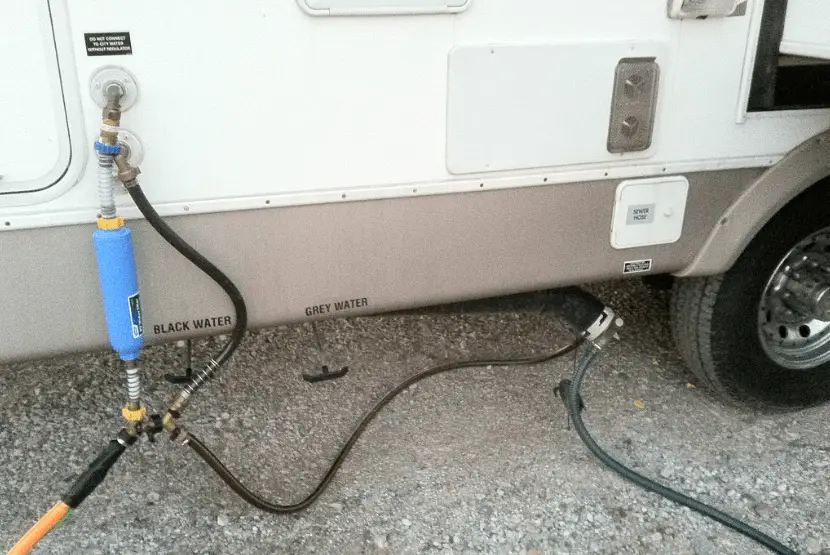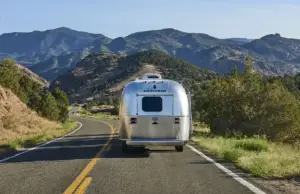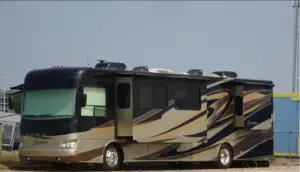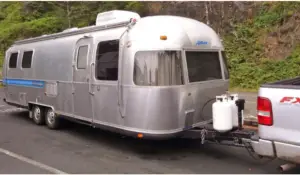All of that glorious water coming in to provide you a shower, that allows you to cook and clean. When travelling it helps with flushing when using the commode on a travel trailer or RV. All of these things happen by the power of a water pump. The water pump is like a second heart in an RV or travel trailer. It pumps necessary liquid for necessary tasks to be carried out. It isn’t the biggest mechanical piece on your RV but it sure is an important one.
If it malfunctions it could potentially ruin your trip. A few of the best RV water pumps are made by Shurflo, Flojet and other companies. They seem to be the ones that are used as a standard or recommended item when purchasing an RV.
But the brand names isn’t all that goes into selecting a water pump for your RV. Things like the GPM, the PSI, the voltage, does it have an auto switch, to where as though when the faucets aren’t on and the shower isn’t being used, does the pump cut off automatically.
Paying attention to brand names could cost more money than the output of great performance you would receive. So to specifically give you the best water pumps on the market isn’t possible as every owner of an RV has different preferences and needs for their RV. Below are a few facts and ideas that will help you have a general understanding of water pumps as vital equipment and their use in an RV or travel trailer setting.
Working and Power Requirements
Water pumps, like stated previously, are a necessary function for comfortable living on your great outdoor adventure. The trailers and RVs of today come standard with a water pump and are manufactured and paired specifically for the RV or trailer that it will be mounted on. Most water pumps are 12 volts, so accurately speaking, it is safe to say that most water pumps run off of the RVs’ battery.
Battery : Some pumps even have their own separate battery for when you are parked at your marked location and the vehicle is off. But, if you feel that 12 volts is not enough to accommodate you and your needs, then you can most certainly search for and buy other pumps with greater voltage.
Even though RVs are a form of a home, except that they are mobile. Do keep in mind that if you buy a water pump with greater voltage you may also need to purchase another standalone power source to assist in its function, not to mention extra add on space to house it.
Volts : You probably don’t want to go any higher than a 24 volt RV water pump, which is regularly used in large trucks and buses. Depending on the size of your RV you may want to consider it. But, just know that it requires extra attention and more frequent maintenance than a 12 volt RV water pump. The standard 12 volt water pump is more than enough to hold its own for you watery needs.
What you do want to pay attention to, if power and performance is a concern for you, is the PSI of the pump or the pounds per square inch, and the gallons per minute that is processed or the GPM.
PSI : The psi is where you will get the pressure of the water that is surging and coming through your pipes and finally through your faucet and shower heads. This in turn raises the gallons per minute spewed from your faucet and shower head.
It is universally agreed that a strong presence of pressure coming out of the faucet and shower head is appreciable. For one, when bathing it makes you feel like you are actually being cleaned, and its just something about weak water pressure that just kind of ruins the experience when dealing with water in a pressure specified situation.
Water Pressure Considerations
The RVs plumbing system is built to handle between 40 and 60 psi of water pressure, give or take of the latter, and anything greater could potentially lead to busted pipes and other damage.
Water pumps for recreational vehicles usually operate between 30 and 45 psi depending on the size of your RV and other specific traits. It is just enough so as to not put unnecessary strain on the pipes of the RVs plumbing system.
The Pit Stop : Depending on where you are in terms of travel on your trip, you can hook your RV up to the city’s water system and have the pressure you are looking for. Ideally, this is when you make a pit stop somewhere like an RV park that accommodates this function for your RV. By doing so, the water will bypass your water pump since the pressure is already adequate.
Tanks : It is ok to turn off your water pump as it will not be used and it will reserve the water in your RVs fresh water tank. Speaking of which. when you have made your pit stop at an RV park, it would be a good idea to check the level of your fresh water tank and top it off if necessary.
Also, if you know the toilet was used often as well as the shower then it would be a good time to check the grey water and black water tanks. Grey water tank holds the water from the sink after use and also the shower. The black water tank holds the waste water.
If necessary, dump both so that way you can prevent any back ups. Even though the black water tank has a vent to relieve the odor, if left unattended too long you could still possibly smell the odor of it. Especially on a hot day.
While at the RV park or wherever you may be, and you are connected to the city’s water system. Before leaving the vehicle unattended it would be a good idea to cut off any flow to your vehicle.
Doing this will prevent any flooding from happening. Don’t want to come back to a gushing of water when you open the door to your RV. Or just simply prevent any unnecessary leaks that will draw time away from enjoyment of your trip.
Keeping the water Pump ON or OFF
Water pumps are special, especially with technology advancing today. More specifically, a water pump can hold a certain amount of pressure that has been pre-determined by the manufacturer in the pipe line when faucets and shower heads are not engaged. This means that when you first turn on your water pump, it takes the time to gather the pressure for use and then it comes out of your faucet head for example.
When you turn your faucet to the off position, the water pump is still active. Because it is still active, it will build pressure up in the pipe and water line and hold it at the manufacturers specified level and be ready to use when you want to use the sink or shower. That’s awesome! Considering that you wont have to wait another five or so minutes for the pressure to build up.
Now, lets return to the pit stop idea. Lets say you, family or friends want to stop somewhere to get something to eat or enjoy a place such as a shopping mall in a famous city. You wont be in your RV for a while so you wont be using the water in it either.
This is a hint to say that you should turn off the water pump while you are enjoying your activity.
After all, the surprises and problems that you could come back to can ruin a good time out and further delay you and family getting to your scheduled location.
If you are feeling a bit indolent about having to take extra time to turn off the water pump and then having to remember to turn it back on, then take that risk and leave it on.
I think the possibilities of problems encourages to just turn it off.
If anything, facilitate some responsibility to someone in your party. Besides, you are the captain anyway, so to speak.
A great captain always takes his or her precautions when it comes to having a smooth and enjoyable trip for his or her passengers. Be that person, it only takes a little time and effort.
Common problems and troubleshooting
Since you are the captain of your RV, figuratively speaking, then you are definitely aware that problems and mishaps exist. You know that you may have to perform some maintenance on appliances and other things in and on your RV.
Well, your water pump is one of those things. It is one of the most used mechanical apparatuses used on the RV. So knowing how to prevent and/or fix common problems on a water pump is required.
It is good to know exactly how your RVs’ water pump is hooked up. The connection of hoses, the fuse connections, how to check if the fuse is relaying power with a volt meter and other electrical and mechanical connections.
This is so you don’t quickly result to your water pump being faulty. Aside from that there are common problems that occur deeming your water pump faulty. For example, the pump runs but no water comes out.
Winterization Problems
When you bring your RV out of retirement from storage, the steps that you took, hopefully, for winterizing it may have something to do with your water pump not working. If the vehicle is not thoroughly flushed and cleared of water, and the antifreeze mixes with the water, it could cause expansion in the water pump and pipes making them crack and render your pump useless.
So if water was not thoroughly flushed then you would need to inspect all connections and working parts for any significant damage.Constant Pump Running- The pump is designed to pump water while switched on and maintain a certain pressure.
If it keeps running then the pump is trying to compensate for lost pressure or insufficient water. This could mean that there are leaks in the water lines or piping or the water is low in the fresh water tank.
Diaphragm
The diaphragm pretty much acts as a filter inside the water pump itself. If clogged or corroded then the pump wont work. Simply remove water pump, look for the diaphragm (refer to owners manual) and clean it or replace if necessary.
(Note: these are just a few problems that exist and can happen.)
Maintenance tips
To prevent any damage, proper maintenance is needed on your RV water pump. Here are some tips:
- When storing your RV in the winter you need to winterize it. Flush the plumbing system and replace water with “RV ANTIFREEZE.” It’s important to use antifreeze specific to an RV.
- At the end of each excursion, flush the plumbing system and the water pump itself which will remove any debris that may have gotten in there and potentially prevent any build up while RV is not in use.When driving, the vehicle shakes. When the pump is on, it vibrates. Be sure to check that hoses connected to and going away from the pump are secured.
- Remember, maintenance before, during, and after is number one priority to enjoy a smooth trip to and from your desired destinations. By establishing regular maintenance on your water pump could easily help your water pump last for as long as nine or more years depending on the integrity of the water pump itself. You may very well draw the short end of the straw and have some bad luck with it.
- But, a proper captain will keep extra parts and fittings on-board at all times as well as directions and manuals to further assist in maintenance and repairs. Be sure to seek an expert, mainly mechanics and the manufacturers of the water pump, and discuss the specifics of a water pump that you have or information for considering to replace with a new one. They can help you with all your maintenance needs, and also tell you whether or not its necessary for your particular needs. Ride Smooth!





